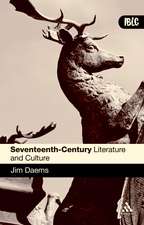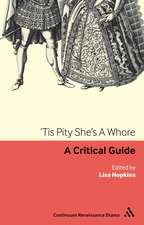Narrating Friendship and the British Novel, 1760-1830
Autor Katrin Berndten Limba Engleză Hardback – 28 oct 2016
| Toate formatele și edițiile | Preț | Express |
|---|---|---|
| Paperback (1) | 372.52 lei 3-5 săpt. | +25.62 lei 10-14 zile |
| Taylor & Francis – 21 mai 2019 | 372.52 lei 3-5 săpt. | +25.62 lei 10-14 zile |
| Hardback (1) | 877.19 lei 6-8 săpt. | |
| Taylor & Francis – 28 oct 2016 | 877.19 lei 6-8 săpt. |
Preț: 877.19 lei
Preț vechi: 1179.08 lei
-26% Nou
Puncte Express: 1316
Preț estimativ în valută:
167.85€ • 175.72$ • 138.88£
167.85€ • 175.72$ • 138.88£
Carte tipărită la comandă
Livrare economică 05-19 aprilie
Preluare comenzi: 021 569.72.76
Specificații
ISBN-13: 9781472463753
ISBN-10: 1472463757
Pagini: 282
Dimensiuni: 156 x 234 x 22 mm
Greutate: 0.54 kg
Ediția:1
Editura: Taylor & Francis
Colecția Routledge
Locul publicării:Oxford, United Kingdom
ISBN-10: 1472463757
Pagini: 282
Dimensiuni: 156 x 234 x 22 mm
Greutate: 0.54 kg
Ediția:1
Editura: Taylor & Francis
Colecția Routledge
Locul publicării:Oxford, United Kingdom
Public țintă
Postgraduate and UndergraduateCuprins
List of Contents
Introduction
1 The Virtuousness of Conventions: Friendship and the Ethics of Fiction
1.1. Friendship Values, Friendship Virtues in Frances Brooke’s The History of Lady Julia Mandeville (1763)
1.2. Mary Shelley’s Frankenstein (1818) and the Narcissistic Impotence of Romantic Friendship
2 Public or Private? Friendship and the Novel Sphere in Utopian and Sentimental Writing
2.1. A Utopian Conjunction? Philanthropic Design and Particular Friendship in Sarah Scott’s Millenium Hall (1762)
2.2. Helen Maria Williams’s Julia (1790) and the Paradigm of Active Sensibility in the Sentimental Novel
3 A Question of Perspective and Character: Friendship and Narrative Situation
3.1. ‘Excite me to Virtue’: Friendship as Reason and Purpose in Charlotte Lennox’s Euphemia (1790)
3.2. The Perceptive Pluralism of Friendship in Sir Walter Scott’s Redgauntlet (1824)
4 The Progress of the Plot: Epistemologies of Friendly Interventions
4.1. Not False, but Wrong? Friendly Interventions in Jane Austen’s Persuasion (1818)
4.2. Friendship, Truth, and the Generosity of Heart in Maria Edgeworth’s Helen (1834)
Conclusion: Friendship and the Novel Genre
Bibliography
Introduction
1 The Virtuousness of Conventions: Friendship and the Ethics of Fiction
1.1. Friendship Values, Friendship Virtues in Frances Brooke’s The History of Lady Julia Mandeville (1763)
1.2. Mary Shelley’s Frankenstein (1818) and the Narcissistic Impotence of Romantic Friendship
2 Public or Private? Friendship and the Novel Sphere in Utopian and Sentimental Writing
2.1. A Utopian Conjunction? Philanthropic Design and Particular Friendship in Sarah Scott’s Millenium Hall (1762)
2.2. Helen Maria Williams’s Julia (1790) and the Paradigm of Active Sensibility in the Sentimental Novel
3 A Question of Perspective and Character: Friendship and Narrative Situation
3.1. ‘Excite me to Virtue’: Friendship as Reason and Purpose in Charlotte Lennox’s Euphemia (1790)
3.2. The Perceptive Pluralism of Friendship in Sir Walter Scott’s Redgauntlet (1824)
4 The Progress of the Plot: Epistemologies of Friendly Interventions
4.1. Not False, but Wrong? Friendly Interventions in Jane Austen’s Persuasion (1818)
4.2. Friendship, Truth, and the Generosity of Heart in Maria Edgeworth’s Helen (1834)
Conclusion: Friendship and the Novel Genre
Bibliography
Notă biografică
Katrin Berndt is Associate Professor of British and Anglophone Literatures and Cultures at the University of Bremen, Germany.
Descriere
Analysing genre-defining novels by Romantic period authors such as Mary Shelley, Charlotte Lennox, Walter Scott, and Jane Austen, Katrin Berndt argues that friendship functions as a literary expression of philosophical values in a genre that explores the psychology and the interactions of the individual in modern society. Contributing to our understanding of the complex interplay of philosophical, socio-cultural and literary discourses that shaped British fiction in the later Hanoverian decades, Berndt’s book demonstrates that novels have conceived the modern individual not in opposition to, but in interaction with society, continuing Enlightenment debates about how to share the lives and the experiences of others.















